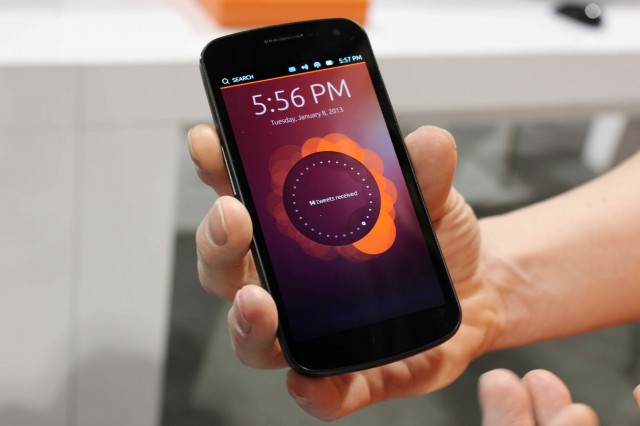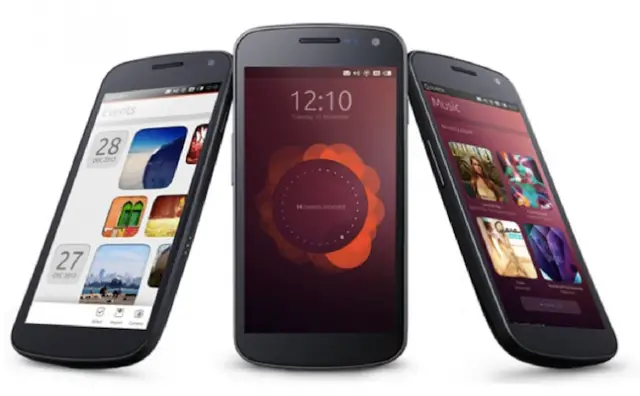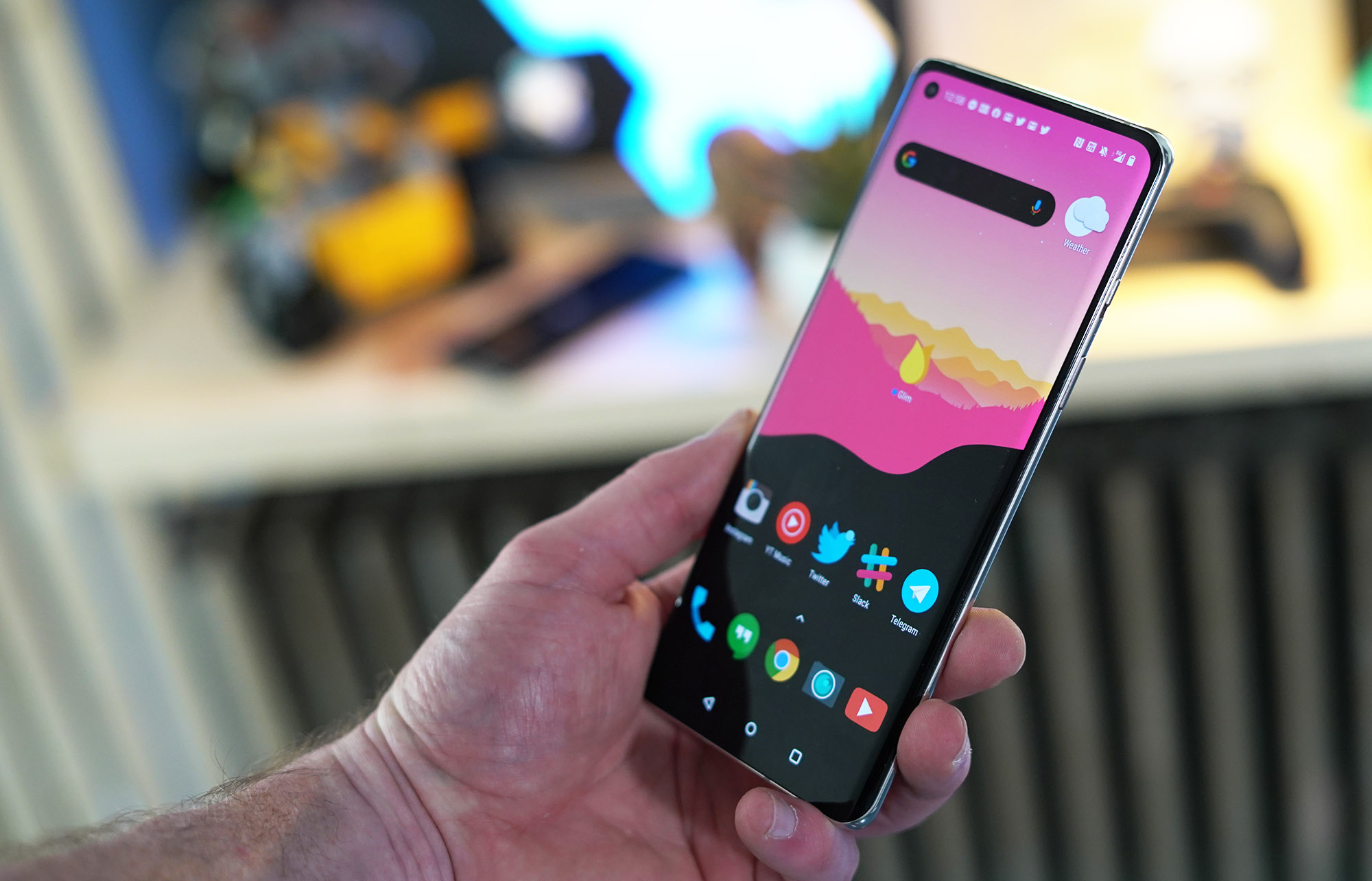Don’t look now, but Canonical has announced some unfortunate news for those who were hoping to get Ubuntu Touch on some rather recent (and even new) Android devices. Engineers have confirmed that they are dropping official support for three different Nexus devices, including the following:
- Nexus 7 2012
- Nexus 10
- Galaxy Nexus
What’s more is that the company has no immediate plans to support the newly-launched Nexus 5 (though they didn’t rule it out for future versions of Ubuntu Touch). That leaves us with the Nexus 4 and the 2013 Nexus 7 as the only two devices that Ubuntu will continue working on for the Ubuntu Touch project.
Their official excuse was that they wanted to scale down focus in order to work on the latest version of Ubuntu, version number 14.04. Had they committed to supporting all the aforementioned devices, they likely would have had to push back the launch of Ubuntu for Phones 1.5 that is set to happen this April.
It’s unfortunate, but Ubuntu Touch is still a very new platform and the team wants to ensure they take the time and care necessary to bringing us a solid, stable product. It’s best that they don’t get too far ahead of themselves as they figure out how to best traverse this rocky mobile landscape.
Builds will be officially discontinued on the final day of this month, so you’ll need to look to the third-party development community to keep the open source project going for those devices (something we imagine will happen with the active and vibrant community that surrounds Ubuntu).
[Ubuntu Launchpad via OMG Ubuntu]












It won’t matter whether they support 1 or a million. Without apps, it’ll be DOA.
Of course that is always an issue, but I’d like to think they would have more developers building more apps if they released for more than just a couple devices.
Wow, a whole year goes by and then can’t keep their promise and now they are scaling down their devices that they support. Don’t see them going very far if this is a trend of things to come.
Not necessarily. 14.04 is a big update for their desktop and server OS, it’s the update they use for their Long Term Support for like 7-10 years I think so they have to get everything working well and stable.
The “trend” has been trending for–let’s see–going on three years now, and is Mark Shuttleworth’s M.O.
Most knowledgeable individuals gave Shuttleworth four more years of this kind of crap, before he would be laughed out of existence–three years ago when his M.O. became transparent.
Looks like the score is: wags: on track; Shuttleworth: on track to oblivion.
Who the hell buys a Nexus device and then uses a home replacement? That’s the most absurd thing… Just buy an HTC or a Samsung if you want a different interface.
That’s such a.. Different point of view. Lol. I think people see stock as boring and value the speed and general lack of bugs it provides. So a home replacement is awesome.
People, myself included, do exactly that all the time. It’s the unlocked nature, timely updates and endless dev support for Nexus devices that draws people in. But it’s custom launchers and ROM’s that allow Nexus owners to customize their devices in a way that works best for them by only adding what they need or want. For me, that means forgoing custom ROM’s in favour of Nova and Action Launcher, which add incredibly handy gesture-based actions and other convenient UI enhancements without the unnecessary bloat that comes with an OEM skin.
What are you talking about? Ubuntu isn’t a home replacement app, it’s an entire OS completely separate from Android.
Bye Bye Ubuntu. Nice never knowing you.
It doesn’t matter. Canonical fails to deliver consistently, the whole thing has been smoke and mirrors. Then again, what do you expect from a company that distributes Linux while doing everything possible to downplay the Linux name, run by a millionaire who has a flight of fancy every five minutes? They spend their whole time chasing their own tails and getting nowhere fast.
Forget Ubuntu touch and support other distros, there will be greater support for Linux on tablets as time goes on. As for the phone, who the **** REALLY needs YET ANOTHER mobile phone platform?
I don’t know a whole lot about Unbuntu, but I fail to see why it’s better than regular Android.
Ubuntu*
One “n” not two.
Right. Sorry. Fixed.
As a platform currently it isn’t better than Android mostly because it’s new and the appstore is non-existent, but there’s always room for that to change. What you do get is a full linux distro on your mobile device which gives a lot of scalability.
Think of the Asus Padphone. You have a phone with a phoneOS that plugs into a tablet and becomes a tabletOS.
One way that Ubuntu will likely evolve to is the same concept only when you plug into a dock or monitor, you now have a full linux desktop that can run phone apps in full desktop mode as well as full desktop apps. It’s where Microsoft wants to go with Windows Phone 8, full convergence.
The other big upside to Ubuntu is privacy. With Google, every thing you do is monitored by Google for the purpose of ad selling, demographics and whatever else corporations pay to have that info. With Ubuntu you won’t have any of that because it’s fully open source and doesn’t gather your data for anything.
Open Source operating systems have potential to evolve fast and with the community comes a great breadth of potential custom distributions that are flavored in different ways. Imagine custom roms for Android, but on steroids. That’s what I’m curious about.
In the end, all this is just subjective though, I don’t really know what will happen with Ubuntu Touch, but I know it’ll be very interesting to watch it happen and I really look forward to the potential with the community.
Upside privacy?
Are you joking? Why on earth do you think Canonical won the “Big Brother” award? Or has been condemned by the FOSS community and RMS? Ubuntu sends ALL unity searches to Canonical’s servers for the purposes of advertising in conjunction with Amazon.
Please do have a go at Google’s creepy practices but don’t pretend Canonical are somehow better. They product place Amazon goods right in the Dash by default, every time you search for an app or file.
Android is far more ‘open’ than Ubuntu touch is right now. It can also be built minus Google’s specific stuff and tailored to your own spec.
Just because Shuttleworth utters the holy word “convergence”, it doesn’t mean you should follow him blindly off a cliff on another foolhardy pipedream that will ultimately go nowhere. What happened to Ubuntu on Android? Ubuntu TV? etc. etc.
When they can deliver a reliable desktop, then let’s talk about phones and other daydreams.
The internet search piece with Amazon can be disabled by a simple toggle whereas with android to get more privacy you’d have to uninstall all Google play services, but since ubuntu touch isn’t complete yet who knows what things will be there. I came into ubuntu after the internet picked up their pitchforks against canonical, but I don’t really get all the gate. I actually really like ubuntu, it’s clean and looks good and gets me away from Windows. I’m not blindly following anyone of a cliff for ubuntu convergence, I’m just saying they’re positioning themselves really well to do it. I don’t plan on leaving android because right now it’s perfect for me, hell been with it since the beginning, but I don’t want to rely on Google continuing to support mobile. Competition is good and if canonical opens up ubuntu touch to where other distributions take their source and make it their own then I’m not seeing a bad side here. In the end the consumer wins.
It can be disabled, but that’s not the point. But it takes more than just a toggle to ‘clean’ it up. Why do you think Canonical used pressure on fixubuntu.com to shut them up? (Under the guise of logo infringement).
Quote from ArsTechnica:
Canonical “abused trademark law” to target a site critical of Ubuntu privacy
Quote from Wired:
Linux Outfit Canonical Launches Campaign to Silence Privacy Critic
Quote TechDirt:
Disappointing To See Canonical Act Like A Trademark Bully Over Ubuntu
Ubuntu is a nice looking desktop, yes, they’ve put a lot of effort into it. It attracted me away from Mac OS X, but they don’t care about privacy or upsetting swathes of users. They are not community guided like most Linux distros, they are subject to the whims of one guy and whatever he dreams up on the bog from day to day.
Also you talk as if Android isn’t open source? It can be built minus any Google stuff (i.e. Kindle), it’s down to who ever builds it. It can be as Google-y or not as you wish. Also Google’s stuff can be disabled, I disable a load of Google stuff on my devices. Believe me, I’m NO fan of Google’s creepy practices, I’d run Replicant if I could. I would love to see a proper Linux on my tablet (probably not my phone though), but I don’t trust Canonical’s commitment, or ability to deliver – sorry but every major project they’ve come up with so far has amounted to nothing. I have lost all faith in them.
Wow, you’re believing the biggest amount of bullshit from a site called Fixubuntu.com that involves literally scaring someone who has NO IDEA how Linux or Ubuntu works OR it’s just a circlejerk for anti-Ubuntu folk to stroke their ego’s over how much privacy is “invaded”. Those quotes are over exaggerated and I stress, the website has absolutely no purpose to exist when you have the disable button.
Canonical did NOT at ANY POINT “launch a campaign” to silence anybody. They sent a cease and desist letter to stop using the logo was all they did.
Do some research or better yet, find some people who aren’t so goddamned paranoid over an OPEN SOURCE distro and.. gee, I don’t know, LOOK at the source code Ubuntu Touch has?
The point I’m trying to make is that Canonical are not all sweetness and buttercups, they don’t care about user privacy or freedoms and are as open source as they legally have to be. If they could develop it all closed source and give nothing back they would.
Moreover, as well as loosing the trust of many Linux users (obviously not you or other Ubuntu fanboys – who will happily take any BS pumped out by Canonical), they fail again and again to follow these grand projects through to completion!
Where is ‘Ubuntu on Android’, that grand project to converge phone with desktop (mmh, sounds familiar) – WHERE? Show me where I can download and use it now.
Where is ‘Ubuntu on TV’, another grand frickin project amounting to nothing?
Where are all these wonderful things? Except for the Desktop and Server versions of Ubuntu, THEY HAVE NOTHING – and Ubuntu is 99% the work of others outside Canonical, i.e. Debian who give their time and effort for nothing – to create a freedom respecting operating system for everyone. Canonical don’t give a fig about that ethos or the millions of man-hours put in by everyone else.
So rather than support some company run by a charismatic leader, I would place my trust in a community lead project – the kind of thing that, ya know ACTUALLY CREATED and maintains GNU/Linux – to come up with something BETTER.
Show me the sources as to what Ubuntu actually does to Debian regarding work they do, sure Debian does package the.. packages onto Debian and Ubuntu from what I’ve heard takes those packages and moves them into Ubuntu’s repository.
For the projects, honestly you really need to take into consideration as to how long a small company like Canonical can take stuff, announcements are a big deal don’t get me wrong but if you understood what actually goes on, they have plans to recode the whole Ubuntu TV base into the Phone/Desktop/Tablet base. I think Canonical has a bit of a problem when it comes to announcing things too soon.
Have some patience, I did lose track of what Ubuntu did when I bought my Macbook in 2008, 2010, I built my own PC with Debian and Linux Mint (different times, no dual booting), Debian was good, Linux Mint made me go back to Ubuntu. So in 2012, I did go back to Ubuntu because I was curious as to what was going on and to my surprise it’s still the same Ubuntu that I remember as a consumer at least. It’s still doing its best to bring Linux to the mainstream and so far China’s gonna adopt Ubuntu as well as other countries! :D
Lastly, regarding the fanboy statement, well stop being so fucking paranoid and either look for exploits or NSA bullshit in the Ubuntu source code or find someone else who understands source code and LOOK FOR THE PRIVACY INVADING SOFTWARE. This isn’t spyware, it isn’t adware, it’s a buncha search results that slow down Unity’s performance. Also, if you think that Ubuntu was nothing but take, take, take, then I have news for you sir, you completely missed out on everything that Ubuntu’s done for the desktop regarding user friendliness and fucking taking it to the mainstream. Absolutely pitiful on your part.
When you start swearing to make a point, there’s something seriously amiss. So this is my last comment to you with expletives you may understand.
Canonical are not saints. They HAVE upset many people who have since switched distros because of things they have done, Unity for one. They give the impression, maybe not to those who have stuck with them, but certainly a large number of ex-Ubuntu users that they don’t particularly care about the community.
Regarding Debian, last time I checked Ubuntu was based off Debian, if that’s wrong sorry. But I think you missed my point, for all they say and all these wonderful projects they announce, beyond the distro they package under the name Ubuntu, the company has nothing – none of these projects have ever come to fruition, if I’m wrong – show me the f*cking products instead of blindly defending this company!
I don’t have to read the f*cking source code to know they send Unity search results to a server and return Amazon products, which are as good/bad as ads. For MANY that DOES invade privacy. If you don’t like it or disagree, fine but don’t c*nt me off for having that opinion – it doesn’t make me paranoid ffs. Why not direct your anger at all the organisations that have outright condemned Canonical for this? Tell them they’re wrong if you feel that strongly.
I will not apologise for criticising a company that makes promise after promise only to have them fizzle out when their boss/whoever comes up with yet another idea. If you think I’m too harsh on Canonical’s faults, I’m far more harsh on the outright creepy and insidious practices of Google, even though I like Android.
My final comment to you is, I will not f*cking apologise for supporting Android on an ANDROID site and criticising a competitor, which would divide the market even more with yet another damn platform.
What Linux distro do you use?
I did use Ubuntu. Now I use Debian and OpenSuse. GNOME on the desktop.
You, and a TON of others. Just keep watching for more announcements of cancelled promises “…in the interests of delivering a better product…”
It will all become very clear to you.
I have been following Ubuntu Touch for the last few months, and I am not too disappointed in this story. This OS was not ready for general use at all last November and was only released to gear up certain developers and partners. I’m sure the important ones can afford to pick up several of the supported devices left if they don’t have any already.
When 14.04 comes out, I am looking forward to seeing how it does on hardware it is built for. There should be at least one brand new phone with the OS as native. If they can’t accomplish that by the end of next year, then I will have lost faith. If they can (hopefully by summer or fall), and it works well, places like XDA (they have an Ubuntu Touch section) are the logical places to go to get the OS for third party phones.
I wish phones had been more like PCs with standard architectures so you could boot whatever the hell you wanted. We didn’t get it though. What can you do, but look forward.
As to why anyone would want Ubuntu over Android, there are plenty of resources on the web that discuss that. In my opinion, users would be better off waiting till later this year before bothering to think about it though – the current release is not competitive and I don’t think enough is known about the next release.
What’s going on?
– 13.10 was marketed as a release of Ubuntu that could run on touch-screens as well as desktops, and yet, it didn’t seem to work on many phones or tablets;
– talk of Touch running Android apps got people excited, and then there was some rowing back;
– photos of Touch flashed on Meizu have been all over then net over the last few days;
– and now this concerted retreat from Nexus devices.
Meanwhile, only 4 days ago, Jono Bacon said “I am aware of the discussions going on, but to be clear, I said I am ‘confident’ several phones will be released. I am not promising anything, but I think the conversations are looking great to give me confidence that we will see traction.”
Like many others, I’ve been eagerly anticipating the arrival of Touch since last February. I hope I’m not going to be disappointed.
You’re going to be disappointed.
I’m in no hurry, tfosorclm.
Linux [proper] will come to touch-screen (as will Windows and iOS proper), convergence (of uses as well as code) is more and more desired, and Open Source will eventually become the preferred model for all software (though I’m surprised that it’s taking so long)!
By your well-reasoned and well-thought-out comment, I’m assuming you’re a normal Linux and computer user(and individual, for that matter), as opposed to a uuser .
Very well put.
Because of my personal usage of computing machinery, I have no need of the characteristics you mention, but I also wonder at their lack.
The technology is there; the answer must be what it usually is: manufacturers do not see inclusion of these new technologies as massively profitable–as of now.
:$ Perhaps I have the zeal of a recent convert! Though I’ve been pro Open Source for a long time, I only moved over to Linux last year when I started to see that not only was the software as good, actually, in many cases it was better.
The reality is that the market is turning away from desk/laptops (except for servers), towards ever more powerful little mobile devices, and Linux needs to be there.
To be honest, the telephony aspect isn’t the most important factor in a smartphone for me either – I want to jot a few ideas down in a document, or a presentation whilst I’m on the go, and then I want to be able to use that work without having to do cartwheels! Is that such a big ask?
“The reality is that the market is turning away from desk/laptops (except for servers), towards ever more powerful little mobile devices, and Linux needs to be there.”
You’re talking as if Linux ISN’T there already, it is there in the form of Android. The kernel is 100% Linux, it’s just minus the userland GNU tools which are not required on a mobile appliance. The main difference is the Dalvik VM where ‘Android’ apps run.
I know Android runs on a Linux kernel – and I think that’s hugely preferable to the proprietary alternatives. But, as we know, Canonical has done something more, and I look forward to being able to use their software on a mobile, touch-screen device.
I do understand, and in many ways I think we want to see the same thing. But I’m not very confident in Canonical’s track record when it comes to actually seeing projects complete and end up in physical products.
I’d rather see something from (just for example) the GNOME, KDE, XFCE projects or something to make a scalable touchscreen interface that would work on mobile devices up to the desktop – something many (rather than one company) distributions could include in their releases – and community driven. We want the same outcome, but are looking to different means to deliver it. :-) (Plus I do like the variety and choice Android has given us already)
I can really sense your disappointment with Canonical: and it does seem that they have a history of promising things which don’t come to fruition.
I think they did deliver what they promised with 13.10 though – it’s just that it doesn’t seem to work on much… yet. (I’d really like to know what’s stopping it happening).
I’ve seen pictures of KDE on tablets, though I admit I haven’t followed it up. I’m sure there’ll be other distributions too, in time.
It makes sense from a technical standpoint. The Galaxy Nexus has an orphan processor which is why Google has stopped supporting it. The 2012 Nexus 7 only has 1G of DRAM which is pretty small if you want to run a full bore Linux. Not clear why they wouldn’t support the Nexus 5 or the Nexus 10, those both have 2G of RAM.
Still sad that the Ubuntu Edge never made it to production :(
I’m not sad to see a competitor to Android not taking off, I just don’t think we need MORE phone platforms in an over-saturated market.
Competition is what drives innovation though. And the market isn’t that saturated. Android and iOS are the only successful mobile OSs out there realy. Windows mobile is struggling to even exist.
I wonder if anyone had the same opinion about the automotive industry when all sorts of automakers were popping up.
Well, Android is as close as we have to a common standard. Which is good IMHO. I can invest in apps and games on one device and brand and move to another without having to buy everything all over again for a different platform. I can have confidence that I’m not pouring money into a black hole. What we need is more Android, more variety – the whole infinite diversity in infinite combinations kind of thing.
Android is open source, manufacturers should be more bold and make more interesting and unique versions, as long as they can execute the same apps – that’s all I care about. Having spent a small fortune in our household on iOS apps for iPads and iPhones, then switching to Android and having to re-purchase everything, I’m not in the mood to keep doing it every time a new platform appears. But each to their own.
To use your analogy, we have various automakers now, all different makes and models, yet they can all run on the same fuel (Android). The automotive industry would be a different place if every single car ran on a completely different method of power.
I’m sure you are aware that Ubuntu was created as open source OS. If it wasn’t for people all around the world, Ubuntu wouldn’t have made it to the mobile scene. I’m sure you are also aware that Android is built on Linux.
And cars do in fact run all different types of fuel. You have the ones that run regular, premium, ethanol, hybrids, and pure battery power.
In the end, the more choices, the more the consumer wins. Competing companies are forced to make drastic deals to make themselves stand out in a crowded market. Also, forces them to create the latest cutting edge features or adopt and attempt to perfect cutting edge technology.
“And cars do in fact run all different types of fuel. You have the ones that run regular, premium, ethanol, hybrids, and pure battery power.”
LOL, I knew that analogy was going to bite me on the ass after I posted it! ;-P But I still say having a standard for apps is a good thing, it means you can invest in the future and developers don’t have to re-write and re-compile for even more architectures.
I have just been reading today about another mobile OS, Sailfish. I’m not it will ever take off but the thing I found interesting is that it will evidently run Android apps, which I do consider to be a positive.
For Linux users, an Ubuntu phone might be more useful than an Android phone. For me, it’s nice that I could use the same Bash and Python scripts I use on my notebook since a full Linux file system and typical utilities (or a simple apt-get install away) are available.
I use Tasker on my Droid 4 to automate things but it’s definitely not robust and is very kludgy. With a more full fledged Linux install, I could make use of cron jobs and upstart events to trigger automation scripts. These scripts can be much more structured and make use of more utilities than a Tasker script. I’ll even set up a Git repo to track the script changes right on the phone then automatically back it up to a cloud or home server when a change is detected.
I’m hoping the first official batches of Ubuntu phones are good (well, I also hope they come out at all). I remember it took several commercial releases for Android to have enough stability and features to become a smartphone for everyday use (at least for me) so I expect Ubuntu Touch will take some time as well. If they fail then I hope some other company will try to do something similar. Maybe one that doesn’t cause so much controversy within the Linux community.
Erm.. last time I checked, Android was Linux. I’ve got a terminal on mine, I use Python (and Lua) too (via SL4A – designed for scripting). Rooting allows access to the entire Linux filesystem. These things just are not on Google Play so a lot of people are not aware of them. So for Linux users, an Android (Linux) phone/tablet is already pretty damn great.
Re: Another company doing something similar, I’m not 100% since I don’t use it, but I believe KDE has a tablet version already. I’ll look into it more if you want the info. ;-)
The point is that it comes with the typical utilities and libraries a desktop Linux user would expect. A Bash or Python script can only go so far with only the built-in functions and libraries. As was said, the file system available on many Android devices are missing many things from what’s found on desktop Linux file systems that can be useful for Linux users even on a mobile device. There was emphasis on this might be useful to some Linux users because there are some (many?) Linux users who don’t do these things on their desktop either.
Anyway, despite the controversies over what Cannoical is doing, a more “full” Linux OS can be very useful to existing desktop Linux users (even non-Ubuntu users) compared to Android. I am one of them. I currently use Arch Linux but if an official Ubuntu phone comes out, I will probably pick it up to see how “full” the Linux experience really is on a official release.
Though I’ve not done it myself, would a chroot environment offer more Linux-yness?
To be honest, I’m not that fussed about phones. I have an Android phone, but based on my usage patterns I’d probably be able to manage with a feature phone. As long as I can text and make calls, that’s enough for me. Although a wifi hotspot is always useful.
But it’s tablets that I’m interested in, as much as I love my Android tablet, I would like to see a powerful/cheap enough x86 tablet that offered full Linux compatibility, preferably with a tablet friendly interface but with the option to run GIMP, LibreOffice, Blender etc. I’d like to see something community driven which could be installed as an option on any distro of x86 Linux, just as KDE or GNOME is now.
(EDIT: It was KDE’s Plasma Active I was thinking of, not my cup of tea but it’s the kind of thing I had in mind.)
I do that but it’s definitely only a current kludgy workaround. One
downside is that Android is running simultaneously with the other OS in a
chroot. Even if one OS is idle, freeing up CPU resources, it’ll still
take up memory that can’t be used by the other OS. You could also
techinically create a dual boot environment but that’s not all that
great either.
An Ubuntu phone won’t have these overhead issues and it’ll be available out of the box so it appeals to me.
This is the main reason why I’m looking into Ubuntu Touch and Sailfish. Sailfish doesn’t provide as much Linux utilities that are pre-installed or available in repos as Ubuntu Touch but it’s still more than Android. I use Tasker on my Android phone too and I agree it’s very limited in terms of what you can do compared to Bash/Python scripts + the plethora of Linux utilities found on Ubuntu Touch. I also make use of Git repos to keep track of my scripts. I back it up automatically to Amazon S3 using Python and the boto library.
Too bad people like us (ie. not quite developers but not typical end users either) are probably too few to really matter in the eyes of smartphone companies. I’m just glad that some mobile OS’s are being built that allows you to do more Linux things from the shell/script/file system point of view than what’s currently available on other Linux/BSD based OS’s.
Interesting that there seems to be a concerted effort to trash Canonical and Ubuntu, using some pretty flimsy material. Vested interests in proprietary software must be really worried when they see Touch.
I see nothing wrong with pro-Android users criticising the opposition, especially with a severely over-saturated market with too many competing platforms.
Why are some Android users so interested in criticising Canonical, and intent on making personal and somewhat snide remarks about messers Shuttleworth and Bacon? If you’ve got the OS you’re happy with…
There’s an old rhetorical-question saying in the railroad industry:
Q: “How do you get a derailed 400-ton locomotive back on the tracks?”
A: “One inch at a time.”
So now we know how Shuttleworth is going to kill Ubuntu: one inch at a time.
Shuttleworth’s antics have guaranteed that there’s not been a question–for a long time–that Ubuntu and Canonical would survive his massive egomania. The only question is: for how much longer.
Careful, you sound like you’re criticising the competition. That may get you flamed ;P
Flame away, all you Ubuntu cult members. I think I can probably handle the hostility of the (probably) three remaining.
One of the absolutely biggest Comical jokes is that Bozo Bacon is still called ubuntu’s “Community Manager”, when no one can find “the community” (quick check: tally the ‘flames’).
The other knee-slapper is that Max Shuttleworth refers to himself as Comical’s “Head”, or “Lead Designer”.
Let’s see some of your code, Max. That ought to be good for a really great laugh.
Mark Shuttleworth suffers from delusions of adequacy.
(Cult members – LOL! It has become a bit of a cult of personality, and like most cults, if you show independent thinking, the drones come out with their blazing torches!)
Agreed 100% with everything you say.